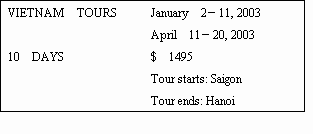
| |||||||||||||||||||||||||||||||||
科目:初中英语 来源:黄冈重点作业·初三英语(下) 题型:050
阅读理解
阅读下面短文,从每题所给的四个选项(A、B、C和D)中,选出最佳选项。

ITINERARY
DAY 1 Arrive in Ho Chi Minh City (Saigon). Meet your travelling companions and a tour leader. Find out about travelling in Vietnam.
DAY 2 Sightseeing in Ho Chi Minh City including Ben Thanh market and Cho Lon, the old Chinese sector. Our local guide will show you how to explore this city.
DAY 3 Visit the Cu Chi tunnels, a complex of 200 km of tunnels used as a center of strategic importance during the US/Vietnam War.
DAY 4 Visit the Christina Noble Foundation, a center for street children. Afternoon free. Overnight train to Danang.
DAY 5 Arrive in Danang. Travel to Hoi An. Travel by local bus to the charming, historic Hoi An river port with a trading history going back to the 15th century. Many ports have not changed in centuries. Sightseeing Hoi An.
DAY 6 Free day in Hoi An. 5 km cycle or walk to the beach is optional.
DAY 7 Bus to historic Hue, for many years Vietnam's educational, cultural and religious center, stopping on the way to visit the Cham Museum in Danang.
DAY 8 Travel by boat along the Perfume River visit the serene and beautiful mausoleums of the old kings of Vietnam.
visit the serene and beautiful mausoleums of the old kings of Vietnam.
DAY 9 Free day in Hue. Overnight train to Hanoi.
DAY 10 Arrive in Hanoi, an enchanting city of tree-lined boulevards, lakes, crafts and art galleries.
1.How does the tour group travel from Hue to Hanoi? It's by ________.
[ ]
2.According to the information, which of the following statements is TRUE?
[ ]
A.The Cham Museum is in Hanoi.
B.Overnight travel to Danang is by bus.
C.The Cu Chi tunnel is 400 km long.
D.There is an old Chinese sector in Ho Chi Minh City.
3.According to the information, Vietnam Tours ________.
[ ]
A.will run this tour twice in 2003
B.charge more to travel in January than in April
C.have been running for many years
D.began operating in 2003
4.The correct order in which these places are visited is ________.
[ ]
A.Hoi An, Hanoi, Hue, Ho Chi Minh City
B.Saigon, Hue, Hanoi, Hoi An
C.Ho Chi Minh City, Hanoi, Hue, Hoi An
D.Saigon, Hoi An, Hue, Hanoi
5.The purpose of this information is to ________.
[ ]
A.promote tourism in Vietnam
B.illustrate how important tourism is to Vietnam
C.outline the details of a tour to Vietnam
D.list the most popular tourist sites of Vietnam
查看答案和解析>>
科目:初中英语 来源:1+1轻巧夺冠·优化训练 英语 七年级下册 (外研版)银版 外研版 题型:050
| |||||||||||||||||||||||||||||||||||||||||||||||||||||||||||||||||||||||||
查看答案和解析>>
湖北省互联网违法和不良信息举报平台 | 网上有害信息举报专区 | 电信诈骗举报专区 | 涉历史虚无主义有害信息举报专区 | 涉企侵权举报专区
违法和不良信息举报电话:027-86699610 举报邮箱:58377363@163.com